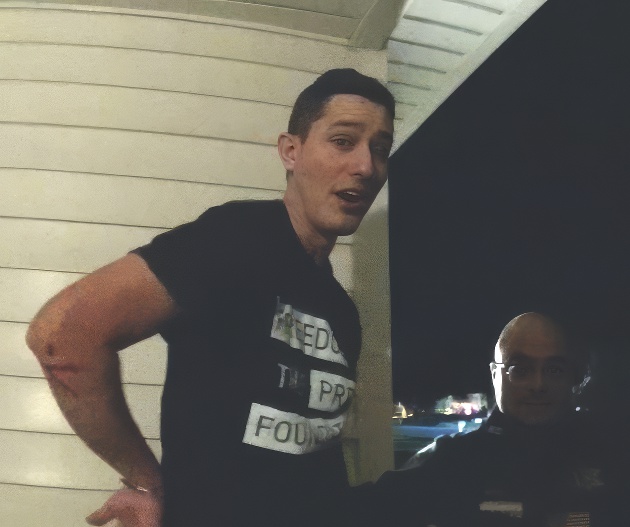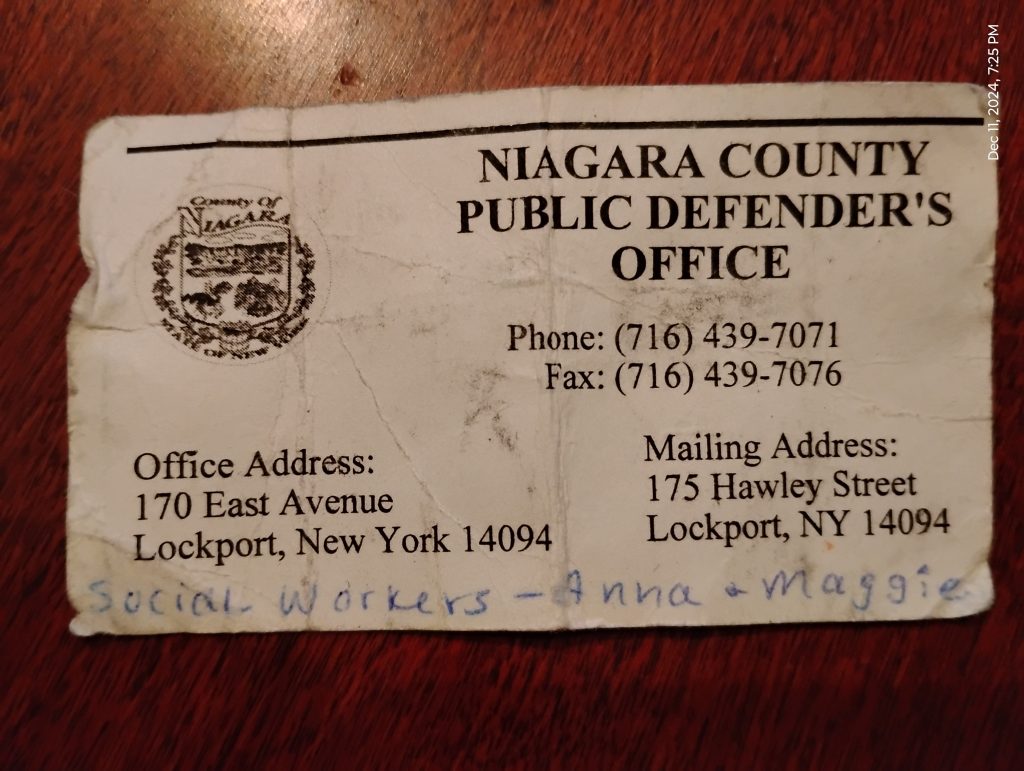
Riford Media
The Arrest at My Home
On October 7, 2024, I was detained at my home by Niagara County Sheriff’s officers Guy Fratello and his compadre. After stepping onto my porch, I was immediately slammed to the ground. One of the officers sat on me as I struggled to breathe—a moment clearly captured on body camera footage that I later obtained and reviewed. I suffered injuries to my arm and leg, with blood running down my arm after the assault. As soon as I could catch my breath, I asked, “What am I being arrested for?” The only answer I received was, “You’re being detained.”

All of this occurred before the officers had even determined why they were at my residence. I was then placed in the back of a sheriff’s vehicle and taken to jail, where I was released the following day.
When I finally reviewed the paperwork, I learned I had been charged with criminal mischief, resisting arrest, and obstructing governmental administration. The Sheriff’s Office claimed I had damaged household items ranging from a couch to a table. What’s telling is that no one inside my residence identified me as the person who caused the alleged damage. In fact, an affidavit was submitted confirming that the items were either not damaged at all or were items I personally owned.
I am representing myself in this case, which is currently pending in Wheatfield Town Court. In December 2024, I filed motions to dismiss the charges for multiple legal reasons, including the use of illegally obtained evidence. Under New York law (CPLR 2219[a]), judges are required to issue written decisions on motions within 60 days after they are submitted. Yet, as of today—August 26, 2025—more than eight months later, my motions remain undecided. My rights are being ignored, with no accountability for those responsible.
Prosecutorial Pressure and Coercion
Despite my pending dismissal motions, the judge allowed the Niagara County prosecutor to enter into plea negotiations with me. This is plainly unethical. By entertaining plea deals before ruling on motions that could potentially clear me of all charges, the court handed the prosecution a significant and unfair advantage.
The plea offer from the Niagara County District Attorney’s Office was that I agree to participate in New York State Mental Health Court in exchange for reducing my charges to a violation. When I asked why mental health court was being suggested, neither the prosecutor nor the public defender’s office could provide me with an explanation. According to its own website, New York State Mental Health Court is designed for people with serious mental health conditions. I do not have any such condition.
Niagara County District Attorney Allison Contrera would write the names of two social workers on a card, which stated “Maggie” and “Anna”. I would be told to obtain a diagnosis with the help of Anna or Maggie by Ms. Contrera.

Behind closed doors, the prosecutor went so far as to pressure me into obtaining a false diagnosis, indicating that it would help me secure a reduced charge. I knew this was deeply wrong, but I also felt boxed in. I eventually sought out a psychiatrist of my own choosing—not one affiliated with the court system. After a lengthy evaluation, I was diagnosed with Attention Deficit Hyperactivity Disorder (ADHD). ADHD is a common neurological condition, not a mental illness. I confirmed this by contacting at least five courts across New York State, from Western New York to Albany. Each one told me the same thing: ADHD does not qualify someone for mental health court.
Following this experience, I filed a formal complaint with the New York State Office of Prosecutorial Misconduct, outlining how the prosecutor attempted to coerce me into fabricating a diagnosis for their own purposes. I have my own opinions about why they wanted me funneled into mental health court, but for now, I’ll keep that to myself. You can view the complaint and supporting documentation here.
Due to my ADHD diagnosis—which is recognized as a disability under the Americans with Disabilities Act (ADA)—I submitted requests for reasonable accommodations to the court in July 2025. Under the ADA, any individual with a recognized disability has the right to request accommodations to ensure equal access to court proceedings. Common accommodation requests include additional time to review materials, permission to record proceedings for accuracy, or the ability to appear remotely when necessary. These accommodations are meant to remove barriers and assist individuals with disabilities in fully participating in the legal process.
What’s interesting is that the Judge Rodney Giove or the Niagara County District Attorney’s office has never recommended an alcohol class. It states in the report that I appeared to be impaired with alcohol. Instead, they immediately jumped on the opportunity to portray me as a “mentally ill” person, suggesting mental health court as part of their “plea deal”.
Did Niagara County legislature Collins have to attend mental health court after he slashed a tire? No, his charges were reduced in a sweetheart deal.
Did Niagara county Mr. Belter have to go to mental health court after he raped multiple girls? No. Interesting, isn’t it?
https://www.cnn.com/2021/11/21/us/chris-belter-assault-sentence/index.html

Lawsuit filed against Judge Rodney Giove and The Town of Wheatfield
The Town of Wheatfield, NY judge presiding over my case, Rodney Giove, denied several of my requested accommodations. As a result, I filed a formal lawsuit against Judge Giove and the Town of Wheatfield in the Supreme Court of Niagara County. In my amended petition and supplemental affirmation, I detailed the numerous rights that were being violated—not only the denial of disability accommodations, but also the court’s ongoing failure to issue rulings on my motions to dismiss the charges. That case is now scheduled to be heard in October 2025.

My experience is not just about one bad arrest or one unfair prosecution—it reflects deeper problems within the Niagara County. Law enforcement officers used excessive force before even determining why they were at my home. Prosecutors attempted to manipulate me into obtaining a mental health condition in order to reduce charges to a single violation. A judge has ignored my motions to dismiss the charges and my rights under the ADA, effectively silencing me in my own defense.
The law is clear: motions must be ruled on within 60 days. The ADA is clear: courts must provide reasonable accommodations for disabilities. Yet in my case, neither of these legal protections have been honored.
As my Supreme Court case moves forward in October 2025, I hope it shines a light on the broader issue: when those sworn to uphold the law disregard it themselves, ordinary citizens are left vulnerable to abuse.
With that, I leave you the story of Julia Davis, DHS whistleblower. One of next articles I will be going into detail about her story. Thanks for reading!
-KR

 Donate
Donate